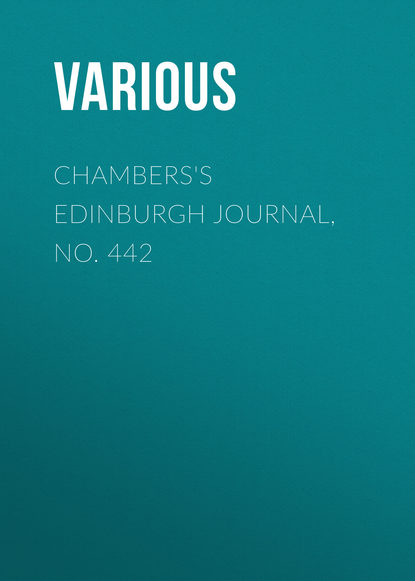По всем вопросам обращайтесь на: info@litportal.ru
(©) 2003-2024.
✖
Chambers's Edinburgh Journal, No. 442
Автор
Год написания книги
2019
Настройки чтения
Размер шрифта
Высота строк
Поля
'Money—interest now due on the mortgage for three thousand francs,' replied M. Destouches with much suavity.
'Interest for two years,' continued the sourly-sardonic accents of Pierre Nadaud; 'six hundred francs precisely.'
'Very good, you shall have the money directly.' Delessert left the room; the notary took out and unclasped a note-book; and Pierre Nadaud placed a slip of papier timbré on the dinner-table, preparatory to writing a receipt.
'Here,' said Delessert, re-entering with a roll of soiled paper in his hand, 'here are your six hundred francs, well counted.'
The notary reclasped his note-book, and returned it to his pocket; Pierre Nadaud resumed possession of the receipt paper.
'You are not aware, then, friend Delessert,' said the notary, 'that creditors are no longer compelled to receive assignats in payment?'
'How? What do you say?'
'Pierre,' continued M. Destouches, 'read the extract from Le bulletin des Lois, published last week.' Pierre did so with a ringing emphasis, which would have rendered it intelligible to a child; and the unhappy debtor fully comprehended that his paper-money was comparatively worthless! It is needless to dwell upon the fury manifested by Delessert, the cool obduracy of the notary, or the cynical comments of the clerk. Enough to say, that M. Destouches departed without his money, after civilly intimating that legal proceedings would be taken forthwith. The son strove to soothe his father's passionate despair, but his words fell upon unheeding ears; and after several hours passed in alternate paroxysms of stormy rage and gloomy reverie, the elder Delessert hastily left the house, taking the direction of Strasbourg. Le Bossu watched his father's retreating figure from the door until it was lost in the clouds of blinding snow that was rapidly falling, and then sadly resumed some indoor employment. It was late when he retired to bed, and his father had not then returned. He would probably remain, the son thought, at Strasbourg for the night.
The chill, lead-coloured dawn was faintly struggling on the horizon with the black, gloomy night, when Le Bossu rose. Ten minutes afterwards, his father strode hastily into the house, and threw himself, without a word, upon a seat. His eyes, the son observed, were blood-shot, either with rage or drink—perhaps both; and his entire aspect wild, haggard, and fierce. Le Bossu silently presented him with a measure of vin ordinaire. It was eagerly swallowed, though Delessert's hand shook so that he could scarcely hold the pewter flagon to his lips.
'Something has happened,' said Le Bossu presently.
'Morbleu!—yes. That is,' added the father, checking himself, 'something might have happened, if– Who's there?'
'Only the wind shaking the door. What might have happened?' persisted the son.
'I will tell you, Antoine. I set off for Strasbourg yesterday, to see Destouches once again, and entreat him to accept the assignats in part-payment at least. He was not at home. Marguérite, the old servant, said he was gone to the cathedral, not long since reopened. Well, I found the usurer just coming out of the great western entrance, heathen as he is, looking as pious as a pilgrim. I accosted him, told my errand, begged, prayed, stormed! It was all to no purpose, except to attract the notice and comments of the passers-by. Destouches went his way, and I, with fury in my heart, betook myself to a wine-shop—Le Brun's. He would not even change an assignat to take for what I drank, which was not a little; and I therefore owe him for it. When the gendarmes cleared the house at last, I was nearly crazed with rage and drink. I must have been so, or I should never have gone to the Rue Béchard, forced myself once more into the notary's presence, and—and'–











